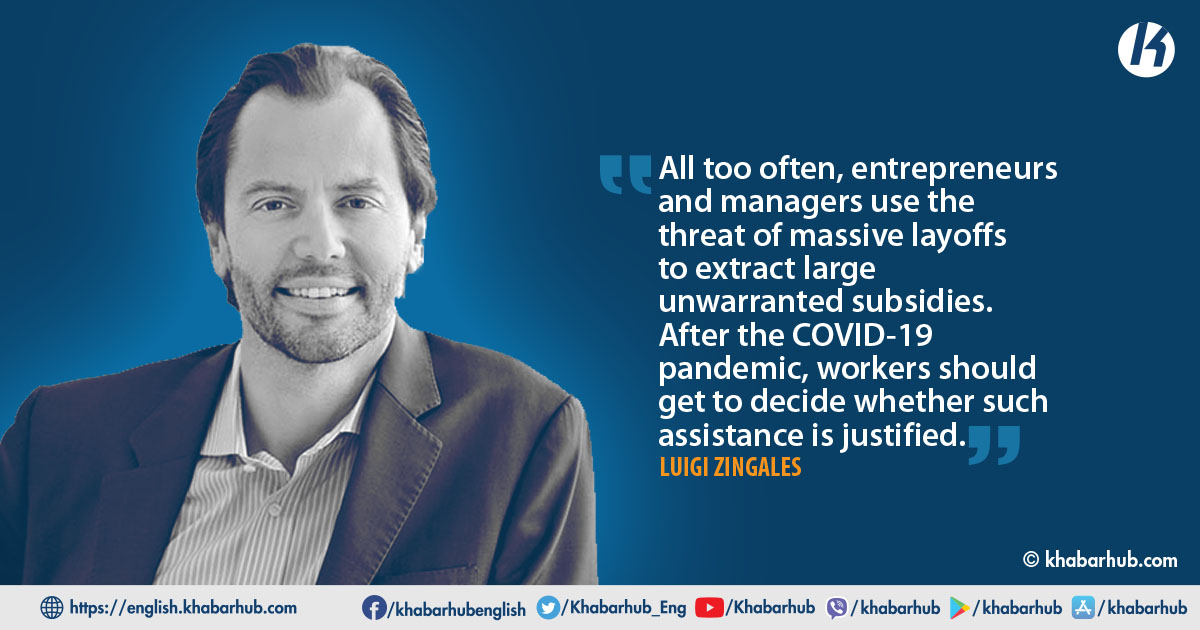As Western economies emerge from the COVID-19 crisis, banks and governments are facing a new problem: how to deal with the corporate walking dead. But an innovative worker-centered scheme could offer a possible solution.
In both the United States and the European Union, corporate bankruptcies have declined during the 15 months of the pandemic, despite the severe accompanying recession.
That decline is a result of rich-country governments – in their understandable desire to soften the pandemic’s economic blow – extending every possible safety net to firms. Often, however, they did so without even trying to separate those with good economic prospects from those with none.
As a result, the business sector’s natural selection process has weakened precisely when COVID-19 has accelerated many preexisting trends, increasing the share of firms that should be considered zombies. But policymakers must now address the wider economic impact of sustaining unviable companies.
Governments cannot abruptly discontinue all business subsidies, of course. During the pandemic, many otherwise healthy firms have accumulated a lot of debt.
The changes produced by the pandemic call for new and innovative firms. But it will be difficult for such firms to enter the market and grow if we waste so many physical, human, and financial resources in keeping zombie businesses alive.
Suddenly subjecting all of them to rigid market discipline would result in a very large number of unnecessary bankruptcies.
Moreover, the economic and financial impact of an immediate cut-off of support would be politically suicidal for any elected government.
The negative GDP shock would have severe effects on both unemployment and public finances, and the losses that a wave of bankruptcies would force on lenders would further weaken banks’ balance sheets.
The near-certain result would be massive voter discontent, all but ensuring the government’s loss at the next election.
At the same time, policymakers cannot continue to help all zombie firms. Such assistance would have large fiscal costs and hamper the productivity growth that Western governments desperately need to solve many of their fiscal and political problems.
The changes produced by the pandemic call for new and innovative firms. But it will be difficult for such firms to enter the market and grow if we waste so many physical, human, and financial resources in keeping zombie businesses alive.
Workers who see no future for their company would prefer the longer period of social protection. On the other hand, those who think their firm has a future would not jeopardize it by voting to liquidate.
Separating the corporate living from the corporate dead is not easy even in normal times: This is what the art of banking is all about.
And while distinguishing between healthy and unviable firms is tricky for the private sector in the best of times, it is particularly difficult to do so now, when there is still a high degree of uncertainty about the post-pandemic world to come.
But the private sector can at least aggressively use incentives to capture diffuse information. This is prohibitively tough for a government agency, especially one that lacks the necessary accumulated expertise.
This is a new version of an old problem explored most notably by Friedrich Hayek. As Hayek showed, the allocation of knowledge in society is diffuse, and it is difficult for any government to gather it in an unbiased way.
But there is a possible way to resolve this difficulty. If you want to assess the quality of a student, there is no more revealing metric than asking her classmates. Those who learn day in and day out with a peer can best appreciate her talent.
In the same way, nobody can gauge the quality of a firm better than its own employees. To weed out zombie firms, therefore, governments should start to condition any subsidy to a company on an endorsement by a majority of its workers.
The problem is that, unlike classmates, employees have an incentive to lie. If the firm were to fail, they would lose their jobs. Because endorsing their company does not cost them anything, most will probably overstate its future prospects.
But this problem can be easily overcome with appropriate incentives. Under such a scheme, if a majority of workers voted to liquidate the firm immediately, its employees would receive unemployment benefits for longer.
Last but not least, this system would empower workers. All too often, entrepreneurs and managers use the threat of massive layoffs to extract large unwarranted subsidies. This time round, workers should get to decide whether such assistance is justified.
If they voted to continue, the government would inject some cash to make the company viable. But if it subsequently were to fail, the workers’ unemployment coverage would be severely curtailed – possibly to zero.
Workers who see no future for their company would prefer the longer period of social protection. On the other hand, those who think their firm has a future would not jeopardize it by voting to liquidate.
If properly calibrated, such a scheme would be able to separate zombies from otherwise healthy firms burdened by the effects of the pandemic.
It would do so by making the cost of subsidies explicit: More support today means that governments may have less fiscal capacity to help workers tomorrow.
Last but not least, this system would empower workers. All too often, entrepreneurs and managers use the threat of massive layoffs to extract large unwarranted subsidies. This time round, workers should get to decide whether such assistance is justified.
(Luigi Zingales is a Professor of Finance at the University of Chicago)
Copyright: Project Syndicate









Comment